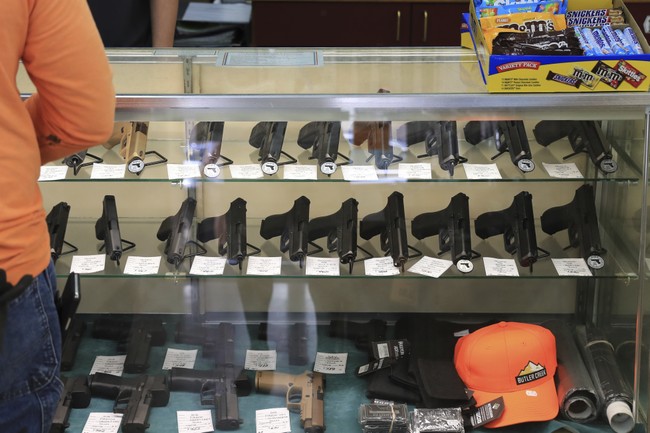A Kamala Harris presidency would mean a continuation of the executive branch attacks on lawful gun owners and the right to keep and bear arms that we’ve seen from the Biden/Harris administration over the past four years, but new ATF regulations and DOJ prosecutions aren’t the only threats that gun owners would face.
As Rep. Elise Stefanik and Rep. Andy Barr write at Newsweek, the weaponization of the financial industry is likely to ramp up as well, with the mandating of merchant category codes tied specifically to gun stores across the country. According to the gun control advocates who back their use, MCC’s are supposed to help banks and credit card companies identify “suspicious” transactions at gun shops, but critics contend that the codes are essentially useless, not to mention a violation of gun owners’ privacy.
The MCCs don’t track specific purchases. Instead, banks and other financial institutions can see when and where a purchase was made as well as the total dollar amount, but they have no way of knowing if a particular transaction involved a gun, ammunion, accessories, or even clothing. That makes it difficult, if not impossible, to identify a “suspicious” transaction, and it could easily lead to companies erring on the side of caution and flagging perfectly innocent transactions. Stefanik and Barr, however, have an answer for that threat.
To counteract this infringement on our rights, we introduced the Protecting Privacy in Purchases Act.
Our bill aims to ensure that firearms retailers are not unjustly targeted by payment card networks or other financial entities, and purchases by law-abiding citizens are protected from monitoring and denial by the government. Specifically, our bill ensures that firearms retailers are not considered differently than general or sporting goods merchants.
This protection preserves the privacy of Americans making lawful purchases, prevents the creation of a backdoor registry of gun owners, and guarantees that legal commerce is not unfairly surveilled or impeded based on the nature of the goods sold.
There is no federal mandate for the use of MCCs, but blue states like California and Colorado have passed measures requiring gun-store specific merchant category codes. Red states like Florida and Texas, on the other hand, have adopted laws prohibiting the use of MCCs to try to track and identify gun store purchases, and the Protecting Privacy in Purchases Act would block any attempt by the Harris administration to impose a mandate through executive action.
Feedback from our constituents has been clear, consistent, and vocal: They have legitimate concerns about being unfairly targeted or monitored for participating in lawful and constitutional activities. Our critical legislation ensures that firearms and ammunition retailers are not singled out for special scrutiny by the financial system.
By preventing the establishment of distinct MCCs for these retailers, we are making it clear that the act of purchasing a rifle for hunting, a handgun for personal protection, or ammunition for sport shooting deserves the same level of privacy as any other legal transaction. Our commitment to this principle is unwavering and founded on the belief that the privacy of American consumers should never be compromised.
With Democrats in control of the Senate, Stefanik and Barr’s bill hasn’t seen much movement. But if Republicans hold the House and regain control of the Senate this week, the Protecting Privacy in Purchases Act could and should become one of the top priorities for the GOP.
This isn’t about taking away a valuable tool to help identify the next mass shooter. In fact, these gun-store specific MCCs are far more likely to lead to gun owners being unfairly and falsely flagged for high-dollar purchases than stopping a killer before they carry out their attack. Stefanik and Barr’s bill is a common sense response to a nonsensical mandate. Let’s hope it’s in a position to pass both the House and Senate after tomorrow’s elections.
Read the full article here


